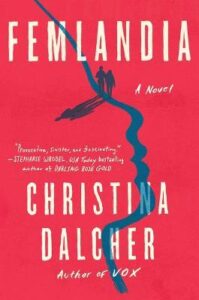In my latest book, Femlandia, a character says, “Anything a man can do, a woman can do equally as well.” But is this the case when it comes to being evil? When I decided to write this piece about women behaving badly in literature, I thought (foolishly, it turns out) I would end up with a stack of books so high that whittling the choices down would be the hard work. Instead, finding enough contemporary books with villainesses was incredibly difficult. Cruella De Vil, the Grand High Witch, and Mrs. Trunchbull might feature on the pages of children’s novels, but modern thrillers tend to be packed with bad men doing the awful deeds. Author Gillian Flynn has addressed the lack of female Randall Flaggs, Hannibal Lecters, and Tom Ripleys in fiction, admitting “there’s still a big pushback against the idea that women can be just pragmatically evil, bad and selfish.”
In Femlandia, I push the boundaries of misandry and radical feminism to a horrifying extreme. The book follows Miranda, a middle-aged woman who finds herself homeless and hungry after an economic collapse. With nowhere else to run, she and teenage daughter Emma seek sanctuary in a female-only commune founded by Miranda’s estranged mother decades ago. What they find looks like a peaceful and fun-loving utopia, but there’s a sinister side to this community. Without giving anything away, I can tell you a few of Femlandia’s residents are guilty of unspeakable acts. I can’t wait for the book to hit the shelves, and I hope it prompts some lively discussion.
Writers always take risks, and I took one in sketching out some seriously screwed-up women. But, as one of Femlandia’s characters points out, why shouldn’t evil be an equal-opportunity trait? Does the mere possibility disturb our traditional world view that the fairer sex is, well, fairer? Maybe.
Here’s a short list of recent books that challenge that notion:
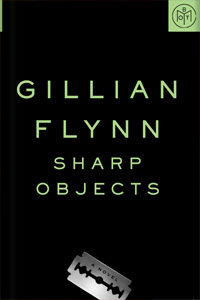
Sharp Objects by Gillian Flynn — Adora Crellin
We could also talk about Amma Crellin in Flynn’s debut novel, but let’s stick to the source of the problem—the mother. Adora (aptly named) showers her daughters with attention. It’s just that it’s the wrong sort of attention in this psychological thriller featuring that worst of all maternal perversions: Munchausen Syndrome by Proxy. It’s difficult to think of a purer evil than poisoning your own child.
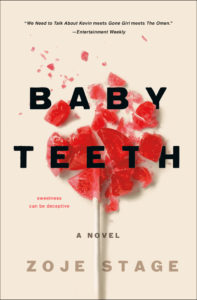
Baby Teeth by Zoje Stage — Hanna Jensen
Move over, Bad Seed. There’s a new girl in town, the daddy-adoring, selectively-mute, seven-year-old Hanna, who works devilishly hard to get her mother out of the way. Part horror, part psychological thriller, and part commentary on the challenges a couple faces when their family unit expands, Stage’s debut is perfectly plotted and incredibly tense. The reader is tempted to feel sympathy for poor little psychopathic Hanna, but she’s just so nasty (see the thumbtack scene) that we all breathe a collective sigh of relief when Mommy and Daddy finally fight back.
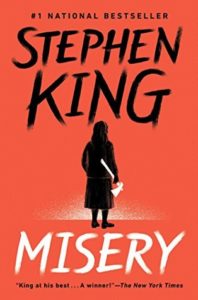
Misery by Stephen King — Annie Wilkes
Like most King novels, Misery isn’t about what it seems to be. The real antagonist here is that demon known to all novelists: writer’s block. But let’s not forget crazy, cockadoodie-screaming Annie Wilkes, the last person you want as your Number One Fan. This woman reads like every pathological case study in an Abnormal Psych textbook rolled together into one scary piece of work. And if you think she was frightening in the film, wait until you see how she immobilizes poor Paul Sheldon in the book.
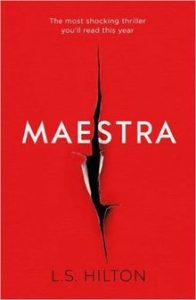
Maestra by L.S. Hilton — Judith Rashleigh
Oh, Judith, you are too smart and too sexy for your own good. If Maestra had come out in the age of the Hays Code (which applied a strict moral scrutiny to films), Ms. Rashleigh would have suffered a terrible end. As it is, she gets away with multiple murders and comes out on top, all ready to do more damage (and have more sex) in the next two installments of Hilton’s erotic thriller set in the art world. Still looking for that female Tom Ripley? Hilton gives us what we’ve asked for.
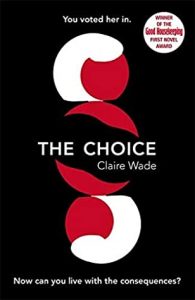
The Choice by Claire Wade — Mother Mason
“You voted her in. Now can you live with the consequences?” That’s the log line for Wade’s debut, and the consequences faced by the book’s characters are terrifying. Mother Mason, a twenty-first-century Big Brother in apron strings, watches over her flock as England’s citizens count every step, calorie, and gram of butter (rationed out in tiny cubes only after a mandatory supermarket weigh-in). Trust me, this one will make you consider the attractiveness of government-imposed sugar taxes.

Rosemary’s Baby by Ira Levin — Minnie Castavet
It’s easy to read Levin’s 1967 novel as a warning about the evils of The Patriarchy, but let’s not forget Minnie Castavet’s role in the (literally) demonic scheme of impregnating an unsuspecting young woman and making damn sure Rosemary delivers. The Tannis root, the psychological manipulation, and the fact that Minnie’s an avid Satanist should be enough reason to include her in this list, but there’s something that frightens me even more—the idea of having nosey Minnie as my neighbor.
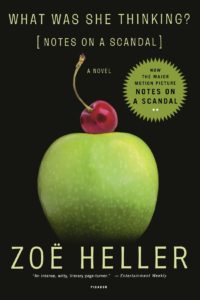
Notes on a Scandal by Zoë Heller — Barbara Covett and Sheba Hart
Heller gives us two bad girls for the price of one; think of it as a BOGO offer on nastiness. Sheba’s character is an excellent gender-switch on Nabokov’s Humbert Humbert, but Barbara’s narcissism and manipulativeness steal the show, eclipsing even the scary sexual exploits of a middle-aged woman and her high-school-student lover. It’s a literary masterpiece about the pitfalls of intimacy and the danger of trusting someone with your confidence.
If we go farther back in time, we can find plenty more women behaving abominably in books. Dumas’ Milady De Winter, Shakespeare’s Lady Macbeth, Steinbeck’s Cathy Ames, Miller’s Abigail Williams, Kesey’s Nurse Ratched, and many others show that we didn’t always shy away from creating a villain in petticoats, and I wonder if we should do it more often. Women make deliciously complex characters, so why shy away from that opportunity?
***


